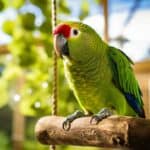Kakariki parrots are delightful pets that offer their owners endless entertainment and companionship. However, like any other animal, they are susceptible to illnesses that can diminish their quality of life if not promptly identified and treated. As a responsible pet owner, it is essential to learn the signs of diseases that your Kakariki may exhibit and understand the common health problems that they may face.
If you notice any changes in your Kakariki’s behaviour, appetite, or appearance, acting quickly and seeking professional assistance is crucial. Most illnesses can be resolved with proper care, and your bird can return to its happy and healthy self.
This article examines the question, “Is my Kakariki sick?”. By the time you have finished reading, you will be able to identify signs of sickness in your bird, understand some common Kakariki health problems and know how to care for a sick Kakariki.
Key Takeaways
- Recognizing the signs of illness in your Kakariki is essential to maintaining your bird’s health and well-being.
- Common health problems that Kakariki parrots can experience include respiratory infections, nutritional deficiencies, feather plucking, and parasites.
- Appropriately caring for a sick Kakariki involves creating a comfortable environment, providing proper nutrition and medication, and seeking veterinary assistance.
Signs of Illness in Kakariki Parrots
Kakariki parrots are generally healthy birds but can fall sick like any other animal. As a responsible pet owner, it is crucial to keep an eye on your pet’s behaviour and appearance, as changes in these can indicate a potential health problem. Some of the common signs of illness in Kakariki parrots include:
- Changes in appetite: If your bird eats significantly less than usual or refuses to eat altogether, it may be a sign of illness.
- Lethargy: If your bird is less active or sleeping more than usual, it may be a sign of a problem.
- Fluffed feathers: If your bird appears fluffed up and inactive, it may have a fever or other health issues.
- Changes in droppings: If your bird’s droppings are discoloured, watery, or contain blood, it may indicate a gastrointestinal problem.
- Changes in vocalisations: If your bird is making unusual noises or not vocalising, it may be a sign of illness or stress.
- Changes in physical appearance: Any changes in your bird’s eyes, beak, skin, or feathers may indicate illness or injury.
If you notice any of these symptoms, it is essential to seek veterinary attention promptly. Prompt diagnosis and treatment can improve the chances of a full recovery.
Common Health Problems in Kakariki Parrots
Kakariki parrots are prone to a range of common health problems. As a responsible pet owner, it is essential to understand these conditions and recognize their symptoms to provide timely and appropriate care.
| Health Problem | Description |
|---|---|
| Respiratory Infections | Lack of proper nutrition can lead to various health problems in Kakarikis. Vitamin A deficiency, for instance, can cause respiratory and digestive issues, while calcium deficiency can lead to egg-binding in female birds. Providing a balanced diet is essential to preventing such issues. |
| Nutritional Deficiencies | Kakarikis are vulnerable to external parasites such as mites and lice and internal parasites such as worms and protozoa. These pests can cause itching, skin irritation, and other health problems. Regular monitoring and appropriate treatment can prevent infestations. |
| Feather Plucking | Kakarikis are susceptible to respiratory infections caused by viruses and bacteria. Symptoms include sneezing, nasal discharge, and laboured breathing. These infections can be severe and may require veterinary intervention. |
| Parasites | Kakarikis are vulnerable to external parasites such as mites and lice, as well as internal parasites such as worms and protozoa. These pests can cause itching, skin irritation, and other health problems. Regular monitoring and appropriate treatment can prevent infestations. |
It is crucial to note that many underlying health conditions can be detected through subtle changes in the bird’s behaviour, appetite, or physical appearance. Regular veterinarian check-ups can help identify and address potential health issues before they become severe.
Caring for a Sick Kakariki Parrot
Proper care for a sick Kakariki parrot is crucial in ensuring its recovery and overall well-being. Here are some tips to help you care for your sick bird:
- Create a comfortable and stress-free environment: Find a quiet place for your Kakariki parrot to rest and recover. Avoid loud noises, sudden movements, or stressful situations. Ensure the room is warm and draft-free, as sick birds are more susceptible to temperature changes.
- Provide proper nutrition: Offer your Kakariki parrot a balanced diet that includes fresh vegetables, fruits, and a high-quality parrot pellet mix. Provide clean water daily. Consult your veterinarian if your bird’s appetite decreases or they have difficulty eating.
- Administer medications or treatments: Follow your veterinarian’s instructions when administering any medications or treatments to your sick bird. Ensure that the dosage and frequency are correct and follow specific storage or handling guidelines.
- Monitor your bird’s condition: Keep a close eye on your Kakariki parrot’s behaviour and appearance. Look out for any changes in appetite, energy levels, breathing, or other symptoms your veterinarian has identified. Record any changes to discuss with your veterinarian during follow-up appointments.
- Seek veterinary assistance: If you notice any concerning symptoms or your bird’s condition does not improve, contact your veterinarian immediately. Prompt, professional attention can be vital in managing a bird’s illness and preventing serious consequences.
Remember, caring for a sick Kakariki parrot requires patience, attention, and care. Following these tips and working closely with your veterinarian can help your bird recover and regain their health.
When to Take a Kakariki Parrot to the Vet
It is essential to monitor the health of your Kakariki parrot and seek veterinary attention if necessary. Some signs may indicate a severe health issue that requires immediate care. These may include:
- Difficulty breathing or laboured breathing
- Loss of appetite or sudden weight loss
- Diarrhoea or abnormal droppings
- Excessive fluffing of feathers or lethargy
- Changes in behaviour, such as increased aggression or decreased activity
If your bird exhibits any of these symptoms or if you notice any sudden changes in their appearance or behaviour, it is important to take them to a qualified avian veterinarian as soon as possible. Routine check-ups should also be performed at least once a year to ensure your bird’s long-term health and identify any potential health issues before they become severe.
Preventive Measures for Kakariki Parrot Illnesses
As a Kakariki parrot owner, preventing health issues should be a top priority. Here are some tips to help you keep your bird healthy:
- Maintain a balanced diet: Provide your parrot with fresh fruits and vegetables, high-quality pellets, and limited seed treats. Consult with a veterinarian or avian nutritionist to ensure your bird’s nutritional needs are met.
- Regular exercise: Allow your parrot plenty of time out of its cage to fly and exercise daily. This helps maintain good physical and mental health.
- Hygienic practises: Keep your bird’s living environment clean and disinfect toys and perches regularly. Provide fresh water daily, and avoid placing food or water near the bird’s droppings.
- Create a safe and clean living environment: Ensure your bird’s cage is the appropriate size with plenty of room to move around. Avoid placing the cage in a draughty area or near a source of toxins, like tobacco smoke or household cleaners.
“Prevention is always better than cure.”
Sometimes, even with the best care, parrots can still fall ill. By implementing these preventive measures, you can ensure that your Kakariki parrot has the best chance of staying healthy and happy.
Understanding Annual Pet Parrot Illnesses
As a Kakariki parrot owner, it’s essential to have an understanding of the common health issues that your bird may face. While some illnesses may occur throughout the year, there are certain annual health problems that pet parrots frequently experience.
One such condition is egg binding in female parrots. This is a potentially life-threatening issue that occurs when the bird is unable to pass an egg. Symptoms include lethargy, fluffed feathers, and a distended abdomen. Egg-binding requires immediate veterinary attention and may involve surgery or other interventions.
Another common health issue in pet parrots is Aspergillosis, a fungal infection that affects the respiratory system. The symptoms include coughing, sneezing, and difficulty breathing, and if left untreated, they can be fatal. This condition can be prevented by controlling humidity levels in the bird’s environment and providing good ventilation.
Psittacosis, also known as Parrot Fever, is another annual illness that pet parrots may contract. This bacterial disease can cause respiratory problems and digestive issues, as well as general malaise. It can be transmitted to humans, so it’s important to take extra precautions when handling sick birds. Seeking prompt veterinary attention and maintaining good hygiene practises can help prevent the spread of the disease.
By staying informed about the annual health issues, you can detect and address potential problems in your Kakariki parrot in a timely manner, ensuring that your bird remains healthy and happy.
Importance of Routine Veterinary Check-ups
Regular veterinary checkups are essential to maintaining the health and well-being of your Kakariki parrot. Avian veterinarians are specially trained to diagnose and treat a wide range of health issues that birds may face. They can also provide valuable advice on nutrition, behaviour, and environmental factors that can affect your bird’s health.
During a routine check-up, the veterinarian will examine your bird, checking for signs of illness or injury. They may also perform diagnostic tests, such as blood work or X-rays, to detect any underlying health problems that may not be immediately apparent.
Preventive treatments, such as vaccinations or parasite prevention, are often administered during routine check-ups. These treatments can help protect your bird from common health issues and reduce the risk of complications.
Establishing a relationship with an avian veterinarian and scheduling regular check-ups can help detect and address potential health issues before they become serious. It is recommended to schedule a check-up at least once a year, and more frequently for older birds or those with ongoing health concerns.
Creating a Healthy Environment for Kakariki Parrots
Providing a healthy living environment is crucial for the overall well-being of Kakariki parrots. Here are some tips to help you set up an optimal living space for your feathered friend:
- Spacious Cage: A large cage will allow your Kakariki parrot to move around freely, spread its wings, and exercise. The cage should be at least two times the bird’s wingspan in length and have horizontal rather than vertical bars to provide climbing opportunities.
- Proper Perches: Kakariki parrots’ feet are zygodactyl, with two toes pointing forward and two backward. Offer a variety of perch sizes and textures to exercise the feet and prevent foot problems.
- Mental Stimulation: Kakariki parrots are intelligent and active birds that need constant mental stimulation. Offer a variety of toys and activities that stimulate the bird’s creativity and curiosity, such as puzzle feeders, foraging toys, or chew toys.
- Safe and Clean Environment: Keep your bird’s living quarters clean and free of any harmful substances, such as toxic plants or cleaning agents. Avoid overheating the cage and make sure the bird has access to fresh water at all times.
By creating a healthy and engaging living environment, you can ensure your Kakariki parrot stays happy and healthy for years to come.
Nurturing the Bond with Your Kakariki Parrot
Building a strong bond with your Kakariki parrot can promote their overall well-being and happiness. Here are some tips to foster a positive relationship with your feathered friend:
- Build Trust: Spend time with your Kakariki parrot every day, talking to them and offering treats. Approach them calmly and avoid sudden movements to build trust and reduce stress.
- Social Interaction: Kakariki parrots are social animals and require interaction with their owners. Include them in your daily routines and offer toys and puzzles to keep them mentally stimulated.
- Mental Stimulation: In addition to toys, offer your Kakariki parrot plenty of opportunities to explore and play in a safe environment. Create an engaging living space with perches, swings, and ladders.
Remember, building a bond with your Kakariki parrot takes time and patience. But with consistent effort, you can create a strong and positive relationship that will benefit both you and your feathered friend.
Conclusion
As a responsible Kakariki parrot owner, it is essential to understand the common health issues that your bird may face and recognise the signs of illness. Regular veterinary check-ups can detect potential health issues before they become severe, and preventive measures like a balanced diet, regular exercise, and a clean living environment can significantly reduce the risk of health problems.
If you suspect that your Kakariki parrot is sick, provide appropriate care, like creating a stress-free environment, offering proper nutrition, and administering necessary treatments or medications. And, if symptoms persist or worsen, seek professional veterinary attention immediately. Remember to nurture the bond with your bird through social interaction and mental stimulation to promote overall well-being.
FAQ
Q: How can I tell if my Kakariki parrot is sick?
A: Look out for changes in behaviour, appearance, or appetite. If your Kakariki is displaying any unusual symptoms or seems unwell, it’s best to consult a veterinarian.
Q: What are the most common health problems in Kakariki parrots?
A: Respiratory infections, nutritional deficiencies, feather plucking, and parasites are some of the common health problems that Kakariki parrots may experience.
Q: How can I care for a sick Kakariki parrot?
A: It’s important to create a comfortable and stress-free environment, provide proper nutrition, and administer any necessary medications or treatments. Monitor your bird’s condition closely and seek veterinary assistance if needed.
Q: When should I take my Kakariki parrot to the vet?
A: If your Kakariki is displaying severe symptoms, experiencing prolonged illness, or if you are unsure about its condition, it’s best to consult a veterinarian for professional advice.
Q: What preventive measures can I take to keep my Kakariki parrot healthy?
A: A balanced diet, regular exercise, maintaining a clean living environment, and practising good hygiene can significantly reduce the risk of illness in Kakariki parrots.
Q: What are the common annual illnesses that pet parrots, including Kakariki, may face?
A: Kakariki parrots, like other pet parrots, may experience common annual illnesses such as respiratory infections, feather moulting issues, or changes in behaviour during specific seasons. Understanding these annual patterns can help pet owners recognise them and address them promptly.
Q: How often should I take my Kakariki parrot for routine veterinary check-ups?
A: Regular veterinary check-ups are essential for the well-being of your Kakariki parrot. Consult with an avian veterinarian to determine the appropriate frequency of visits based on your bird’s age, health condition, and specific needs.
Q: What can I do to create a healthy environment for my Kakariki parrot?
A: Provide a spacious cage, offer mental stimulation, ensure proper perches, and avoid exposing your Kakariki to toxic substances. These measures will contribute to a healthy and happy living environment for your bird.
Q: How can I nurture a strong bond with my Kakariki parrot?
A: Building trust, engaging in social interaction, and providing mental stimulation are key to nurturing a strong human-bird bond with your Kakariki parrot. Spend quality time with your bird, offer treats, and use positive reinforcement techniques to strengthen your relationship.



Have comments or questions about this article? Then get involved!
Spotted an error or something we have missed? Let us know